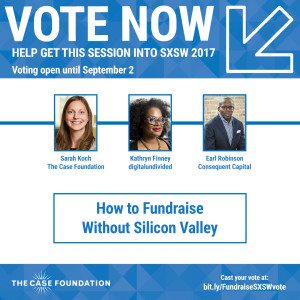The Case Foundation is heading to SXSW this month for five days of Interactive programming and events. While there, we will certainly dine on breakfast tacos and good ole’ Texas barbecue, but most importantly we will participate in and host a series of engaging can’t miss SXSW sessions and activations onsite designed to turn interest in to action.
In particular, the Case Foundation is excited to interact with SXSW participants at one of our sessions featuring our own Jean Case, Steve Case, Emily Yu, Sarah Koch as well as to debut our first-ever #GetInTheArena Lounge, in partnership with Oculus (at the JW Marriott from March 11th to March 15th). There, we invite you to “Get In The Arena” and share how you will turn intention into action on the causes you care about, learn about the future of social good and hear more about the important work the Foundation is leading throughout the year. A few highlights:
- Record a short film in our 360-degree video OrcaVue that will capture your very own “Get in the Arena” video moment;
- Check out the virtual reality videos courtesy of Oculus for Good;
- Donate to a charity of your choice with GoodWorld as they bring the #donate phenomenon to attendees live on site;
- Demo our soon-to-be-released Impact Investing Network Map;
- Test your knowledge of the inclusive entrepreneurship ecosystem;
- Share what you are going to do to “Get in the Arena” in 2017.
Veterans of SXSW will tell you there are countless sessions and meet-ups on just about every issue you care about—from ocean exploration, to inclusive entrepreneurship, to tech for good platforms that are changing the way we champion causes. To make the best use of your time at SXSW, here are 20 sessions that we think you shouldn’t miss:
MARCH 10th
1. The Rise of Academic Incubators 11:00am – 12:00pm
Hotel Van Zand, Lady Bird Ballroom
Join Texas A&M, Harvard University and more as they share how universities are responding with pathways, such as curriculum enhancements, mentorship programs, and physical incubator space, to facilitate connections to students, potential investors and industry leaders
2. Funding Our Future: Investing in Diverse Startups 12:30pm – 1:30pm
Hilton Room 400-402
Valmo Ventures, Base Ventures and Connectivity Capital Partners share why the growing trend of more tech startups being founded by Women, Latino, Black and Asian founders, greater investment in these ventures is needed to ensure the innovation and economic growth across all communities that these founders represent as the global population becomes more diverse.
3. Convergence Keynote Photographer Cory Richards 2:00 p.m. – 3:00 pm
Convention Center Ballroom D
A climber and visual storyteller, Richards was named National Geographic Adventurer of the Year (2012) and a National Geographic Fellow (2015). His photography has appeared in National Geographic Magazine, Outside Magazine, Man of the World, and The New York Times.
MARCH 11th
4. Navigating a Rapidly Changing and Connected World Steve Case and Beth Comstock 9:30am – 10:30am
Convention Center Ballroom EFG
Sensors that track a food’s temperature from source to store. Hospitals designed to avoid misdiagnosis. Traffic lights that actually respond to traffic. These are the changes we are likely to witness in the Third Wave: a period in which entrepreneurs will use technology to revolutionize major sectors—healthcare, manufacturing, education and food—and transform the way we live. Steve Case, co-founder of AOL and CEO of Revolution and Chairman of the Case Foundation, and Beth Comstock, Vice Chairman at GE, discuss how to adapt to the changes coming our way.
5. Changing the Face of Entrepreneurship with Jean Case 11:00am – 12:00pm
Hilton Salon C
Talent is everywhere, opportunity is not. Tech pioneer and investor Jean Case explores the journey of fearless entrepreneurs who are changing the way business is done. She sits down with Reena Ninan of CBS News to discover the wide range of dynamic pioneering founders who are closing the opportunity gap and scaling creative solutions to persistent global problems. Challenge the traditional notions that entrepreneurs are exclusively wealthy, Ivy League educated white men in this conversation on how a new breed of entrepreneurs from all walks of life are fueling economic growth and shattering the status quo.
6. How Elections Change Next Gen Cause Engagement 3:30pm – 4:30pm
Hilton Salon F
Fact: Millennials value cause engagement. But what happens during an election year? Could politics influence how this generation participates in social causes? Achieve, in partnership with the Case Foundation, conducted a multi-stage research study on the millennial generation’s cause engagement as related to their political ideologies. The study measured how the 2016 U.S. presidential election affected how Millennials across the country engaged with social causes. The final 2016 Millennial Impact Report identified what, if any, demographic factors are connected to engagement trends. The final report will be debuted exclusively at SXSW and reveal key shifts that will alter how we think about this generation of changemakers. Speakers include Emily Yu of the Case Foundation, Abby Philip of the Washington Post, Carolyn DeWitt of Rock the Vote and Amy Thayer of Achieve.
7. Payments Gone Viral: The Rise of Social Commerce 3:30pm – 4:30pm
JW Marriot Salon D
Augmented reality. Hashtag payments. Messenger bots. The payments space is fundamentally changing: cash and checks gave way to credit and debit cards, which are now being replaced by apps. In an era where social proof reigns supreme, how is social media shaping the future of commerce. Meet a diverse cross-section of companies pioneering social payments: the ability to buy, pay and give on social media. Moderated by finance veteran Hans Morris (Visa, Citigroup, Nyca Partners), this session shows how the latest technologies enable people to pay where they play. Speakers include Dale Nirvani Pfeifer of GoodWorld, Kahina Van Dyke of Faecbook, Hans Morris of Nyca Partners and Ambarish Mitra of Blippar.
8. Harlem: The New Tech Frontier 5:00pm – 6:00pm
Hilton Salon E
Join Jessica O. Matthews of Uncharted Play as she explores how the startup is democratizing energy access worldwide, and changing the face of innovation. With its core technology MORE, (Motion-Based, Off-Grid, Renewable Energy) – a scalable system of micro-generators that can sustainably power cities – the company is eyeing infrastructure opportunities in emerging markets.
MARCH 12th
9. Keynote with Lee Daniels 11:00 am – 12:00 pm
Convention Center room 18ABCD
Lee Daniels is a widely recognized director, writer, producer, and philanthropist in both the film and television space. He is perhaps best known for the 2013 critically acclaimed box office smash Lee Daniels’ The Butler, in addition to his 2009 feature Precious: Based on the Novel by Sapphire, which was nominated for six Academy Awards including “Best Motion Picture of the Year” and “Best Achievement in Directing.” The film also made history as Daniels became the first African-American to be nominated for the DGA’s Outstanding Directorial Achievement in Feature Film Award.
10. Humanitarian Design In Action 11:00am – 2:00pm
Hilton Salon D
In recent years, universities across the country have been increasingly engaging with the entrepreneurial ecosystem, developing programming internally to cultivate entrepreneurial activities and working to bring entrepreneurs into the university. Join MIT, Rice Univesity, StartX and the University of Chicago as they explore what bridges are currently being built to facilitate flows of information and people between universities and the entrepreneurial ecosystem.
11. Tech for Good: Solutions for the Refugee Crisis 12:30pm – 1:30pm
Westin Continental 2
When lives are at stake, it can be difficult to figure out how we can make a real difference. The Humanitarian Design Summit with Google, Facebook and Crack + Cider is about meeting the people who are using everyday design practices to prevent suffering and save lives. This workshop will task participants with rapidly designing responses to a real world crisis scenario. The goal isn’t to solve a difficult humanitarian problem, instead it’s an opportunity to test out the principles of Humanitarian Design in a risk-free environment with world-class designers.
* This session requires RSVP, and access will only be available to badge types listed under “Primary Access.” RSVP HERE.
MARCH 13th
12. How Tech Companies Can Give Back to Communities 12:30pm – 1:30pm
JW Marriot Salon D
Join Andrew Keen, Elaine Weidman-Grunewalk from Ericsson, Gary Shapiro of Consumer Technology Association and John Donovan from AT&T as they explore game-changing technologies and disruptive innovations and the sharing economy bring the power to improve our lives and what are the best practices that allow “Technology for Good” to authentically come into play with both the bottom line and corporate responsibility and community engagement.
13. Turning Inspiration Into Action on Instagram 12:30pm – 1:30pm
Hyatt Regency Ballroom 1
With over 600 million users, Instagram is the 2nd largest platform behind Facebook. From curated content to real life moments, Instagram is a place for inspiration and discovery. But how can marketers move inspiration and discovery to action? In this session, Instagram’s Michael Hondorp, the retail lead for the brand, will discuss the most innovative ways brands are driving impact with Instagram. From using ad formats in unexpected ways, to developing ideas customized for the feed, attendees will leave inspired to think differently about creating for the platform.
14. Interactive Keynote: Adam Grant 2:00pm – 3:00pm
Convention Center Ballroom D
Wharton’s top-rated professor, a New York Times writer on work and psychology, and author of Originals: How Non-Conformists Rule the World and Give and Take: Why Helping Others Drives Our Success. Grant has been recognized as one of the world’s 25 most influential management thinkers, and Fortune’s 40 under 40.
15. Kimbal Musk on Trust: The Currency of Our Generation 3:30pm – 4:30pm
Convention Center Ballroom EFG
Musk sits down with Fast Company magazine’s Amy Farley exploring the ability of consumers to uncover truth and authenticity in seconds with the help of the Internet is creating incredible opportunities in the food industry. As cofounder of The Kitchen, a family of businesses working in tandem to bring #realfood to everyone, he will discuss how farmers, consumers, and companies are demanding and delivering trust back to the table.
MARCH 14th
16. Investing to Change The World 9:30am – 10:30am
Convention Center Ballroom EFG
This panel will offer practical and powerful solutions for people who want to generate positive impact on society through their investments. Join Ben Jealous and Karina Funk of Kapor Capital, with Dune Thorne from the Brown Advisory and Victoria Fram of Village Capital as they explore the forefront of impact investing and will explore opportunities that range from green bonds to public equities to private equity investments. You can generate profits AND progress by investing in companies with cutting-edge environmental strategies, in bonds that fund clean energy or support low-income communities, and in innovative private investments that seek to drive social change.
17. National Geographic Explorers Changing the World 11:00am – 12:00pm
JW Marriott Room 203-204
National Geographic pushes the boundaries of exploration to further our understanding of the planet and empower us all to generate solutions for a healthier and more sustainable future. Meet the Emerging Explorers—fearless young scientists, conservationists, storytellers, and innovators who are harnessing technology to expand the frontiers of exploration. Join a discussion about taking risks, being bold and failing forward to change the world through technology for good with National Geographic Explorers Topher White and Erika Bergman and CEO Gary Knell.
18. How to Fundraise Without Silicon Valley 3:30pm – 4:30pm
Hilton Salon C
We are witnessing a new wave of investment and entrepreneurship in the United States. How can we level the playing field for women-entrepreneurs and entrepreneurs of color to fund, grow and scale their thriving businesses? Learn both investor and entrepreneur perspectives on what it takes to build and back inspiring companies and bring the deal process to life for diverse founders. Join Earl Robinson of Consequent Capital, Sarah Koch of the Case Foundation, Nicole Sanchez of eCreditHero and Carolyn Rodz of Circular Board for this engaging discussion.
MARCH 15th
19. Nonprofits Get the Keys to the VR Kingdom 12:30pm – 1:30pm
JW Marriot Salon 3-4
Virtual Reality has been touted as the ultimate empathy engine, immersing viewers in experiences that can open their eyes and create personalized memories for important causes. To widen the reach of this unique immersive technology to deserving nonprofits, Oculus has created the “VR for Good” workshop that pairs budding filmmakers with veteran VR talent to craft powerful storytelling pieces for a variety of featured charities and causes. Participants in the inaugural launch of this program will discuss their process in collaborating with these nonprofits and how the program combats the pitfalls that worthy causes often face with innovative marketing approaches.
20. How Brands Do Well By Doing Good 3:30pm – 4:30pm
JW Marriot Salon D
Cynics believe a marketer’s biggest goal is to get a consumer to click on an ad and purchase a product. This is especially true when it comes to digital advertising, which is immediately measurable, both in its success and failure. That’s what we call short-term thinking. The best brands think about themselves—and their stories—in the long term. They consider how to connect with consumers in a way that feels authentic, and that communicates something about what the brand stands for, something that goes far beyond whichever product they’re currently peddling. Upworthy presents the brands that do well by doing good.
Have a session or event that the team shouldn’t miss? Tweet us @CaseFoundation. We look forward to seeing you there!











![story1SXSW[InHand]](http://casefoundation.org/wp-content/uploads/2016/04/story1SXSWInHand.jpg)
![story2SXSW[2]](http://casefoundation.org/wp-content/uploads/2016/04/story2SXSW2.jpg)
![story3SXSW[2]](http://casefoundation.org/wp-content/uploads/2016/04/story3SXSW2.jpg)
![story4SXSW[3]](http://casefoundation.org/wp-content/uploads/2016/04/story4SXSW3.jpg)